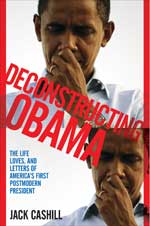Proud to be a "Love Letter Truther"
Get your copy of Deconstructing Obama

___
Jack Cashill's book:
Hoodwinked: How Intellectual Hucksters have Hijacked American Culture

Click here for signed first edition
©Jack Cashill
WND.com - June 6, 2012
In a recent column, I posited that Barack Obama did not in any meaningful way write the love letter Washington Post reporter David Maraniss unearthed for his new book, “Barack Obama: The Story.”
The wannabe author who wrote the spectacularly awful “Breaking the War Mentality” for the Columbia University Sundial under his own name could not have written this esoteric, exquisitely punctuated letter unaided during the same time period.
As I wrote at the time, Maraniss “owes his reader some proof of the letter’s legitimacy. He should tell us whether he saw a hard copy of the letter, whether it was typed or hand-written, and why it reads so much better than Obama’s published work of the same period. He does none of the above.”
After I had raised these questions, David Weigel of Slate posed them to Maraniss. Weigel’s great claim to fame, by the way, is that he coined the term “birther.” Hoping perhaps to strike gold twice, Weigel published Maraniss’s response in an article titled “Meet the Obama Love Letter Truthers.”
“It is preposterous on its face, utterly made of whole cloth,” wrote Maraniss about my assertion that Obama did not write the letter in question without help, I being the only “Love Letter Truther” on the planet.
“It is not worth taking seriously, in my opinion, and fruitless in any case with people who want to believe what they want to believe, despite all facts and common sense to the contrary,” Maraniss continued.
I did not accuse Maraniss of fraud. For the record, I just wanted to know in what format he saw this letter. As the reader will observe, he did everything but answer the questions I posed.
In researching his book, Maraniss has unearthed still another early literary nugget. Apparently, the young Obama had convinced a friend that he really was a writer, and so the friend sent Obama a manuscript to review. Obama replied with a list of writing tips.
Although brief, these tips are worth review because they show many of the faults on full display in Obama’s Rosetta Stone, the 1,800-word “Breaking the War Mentality.”
Let us just look at the first of the five tips Obama sent to his friend: “Careful about too many adverbs, particularly describing how people speak (Paul asked disbelievingly, etc.). It can be cumbersome and a bit intrusive on the reader.”
There are several classic Obama problems on display here. For one, Obama has no feel for the use of participles. The word “describing” attaches itself to nothing. The sentence would more profitably read, “particularly those describing how people speak.”
For another, the word “it” clearly lacks an antecedent. Obama is likely referring to “too many adverbs,” but that phrase would require a “they” not an “it.”
Finally, as we will see in the Sundial essay, Obama frequently misuses words. Yes, too many adverbs can be cumbersome, and they can be intrusive, but they are not “intrusive on” anyone. This is just an awkward turn of phrase.
In the second of the tips, Obama reveals again his maladroit word selection. “Resist the temptation of easy satire,” Obama writes. “Good satire has to be a little muted. Should spill out from under a seemingly somber situation.”
Although his advice is reasonable, Obama undoes the effect with “somber,” an altogether inappropriate word. “Somber” means gloomy, solemn, mournful. I think he meant “serious.”
Among Obama’s other problems as a young writer was his random placement of commas. That problem shows itself in the fourth of the five tips: “Think about the key moment(s) in the story, and build tension leading to those key moments.”
This sentence has no need for a comma. Like the other miscues, this one would not be fatal if Obama had been offering tips on how to rewire a house, but he was telling his friend how to rewrite his manuscript.
What we see here is a misplaced belief in one’s own gifts, a failing very much in evidence from the first days Obama took center stage.
“I’ve written two books,” Obama told a crowd of teachers in Virginia in July of 2008. The crowd applauded. “I actually wrote them myself,” he added with a wink and a nod, and now the teachers exploded in laughter. They got the joke: Republicans were too stupid to write their books.
The problem, of course, is that Bill Ayers helped Obama with his acclaimed 1995 memoir, “Dreams from My Father,” and his staff, most notably speechwriter Jon Favreau, helped him with his second book, the 2006 “Audacity of Hope.”
Harvard’s fatuous James Kloppenberg describes “Audacity” as “a refreshingly serious and cogent account of American political and cultural history.” It is this book, the professor argues, that puts Obama in a league with Wilson and Teddy Roosevelt as a thinker and that establishes his bona fides as a philosophical pragmatist of the highest order.
Not everyone agrees. Ayers, who was much closer to the action, is also much closer to the truth in dismissing Audacity as a “political hack book.”
Kloppenberg also tells us, “But since I began investigating Obama’s ideas, no one who knows him has expressed any doubt to me that both books are his work.” What can I add?
I was hoping Maraniss would set the literary record straight. Although I have yet to read the book – it debuts June 19 – I have seen enough to abandon that hope.
Webmaster's Note: Jack Cashill's Book-TV presentation of "Deconstructing Obama" can be viewed at http://www.c-spanvideo.org/program/298382-1
Editor's note: For a more complete account of this phenomenon, read Jack Cashill's amazing book, "Hoodwinked: How Intellectual Hucksters Have Hijacked American Culture.

